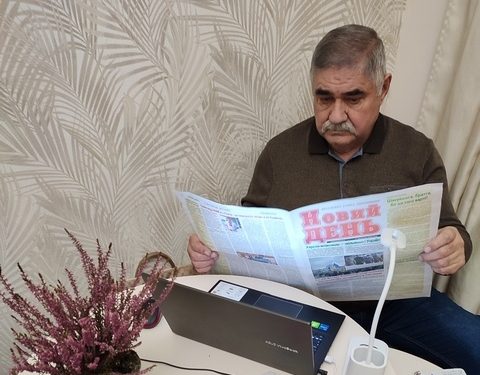Anatolii Zhupyna, a publisher and the editor-in-chief of the Novyi Den newspaper from Kherson, spoke about the urgent problems of his publication during an online meeting of editors with the management and representatives of the Ministry of Culture and Information Policy.
“Many journalists today wonder if the Ministry of Culture and Information Policy plans to pay attention to the work of Ukrposhta [state-run postal service]. I think that after this full-scale russian aggression, many local newspapers (and not only in the de-occupied and front-line territories) will disappear from the information field of Ukraine,” noted Anatolii Zhupyna. “Today, 30%of local publications stopped publishing during the full-scale war. I believe that a great “share” of this problem is on Ukrposhta.”
The Novyi Den editor noted that before Ukrposhta head Ihor Smilianskyi took office, there were 450 post offices in the Kherson Region. With his arrival, the number decreased several times; in many villages, post offices were shut down, which immediately affected the subscription volumes. People did not want to subscribe to newspapers that were delivered to them with a great delay, to say nothing at all about delivery to the subscriber’s addresses.
But russians well understood the meaning of the printed word. In a short period, they opened 500 post offices in the temporarily occupied territory of the Kherson Region, added Anatolii Zhupyna.
“My proposal is to hold a joint meeting of representatives of the Ministry of Culture and Information Policy, the National Union of Journalists of Ukraine (NUJU), and Ukrposhta. Perhaps in such a joint discussion it will be possible to develop an action plan to improve the situation with the delivery and subscription of local publications. This will be especially necessary and important for the de-occupied territories,” the editor emphasized.
He raised another important issue, which, I think, worries the editors of the Novyi Den newspaper, and not only.
“During the shelling of Kherson, our newsroom was destroyed, gas and water supplies were cut off. But the water and gas bills still arrive,” Anatolii Zhupyna says indignantly. “Not only that, even during the occupation, when russian occupiers owned the premises of Novyi Den, the editors were charged gas, water, and electricity bills. This is unfair, and this injustice should be improved somehow!”
Prepared by Olha Voitsekhivska, Journalist of Ukraine

 THE NATIONAL UNION OF
JOURNALISTS OF UKRAINE
THE NATIONAL UNION OF
JOURNALISTS OF UKRAINE
















Discussion about this post